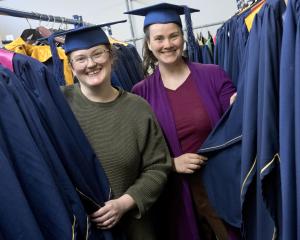
Drive to any Auckland suburb today and you will find families of all colours and cultures living alongside one another.
But to turn on prime-time television, it often seems we live in a rather monochromatic world.
It is not simply a question of colour - our television often reflects one viewpoint, one experience and one set of sensibilities.
As New Zealand's cultural make-up changes and diversifies, television is so busy keeping up with the Joneses that it largely ignores the Patels, the Chans and the Moons.
When a postgraduate class were discussing this issue they came up with a simple solution - they would make their own TV show.
Of course, it was not quite that simple.
But six years later the Thousand Apologies Collective - formed by seven writers and film-makers - has made its debut series, which screens at 9.30pm, Fridays on TV3.
Described as a "pan-Asian sketch comedy series", A Thousand Apologies is New Zealand's first prime-time Asian programme, says collective member and University of Auckland senior lecturer Shuchi Kothari.
But while the series is a significant step to seeing different cultures on television, Kothari insists that it is primarily a comedy.
"We really want people to laugh, more than anything," she says.
"It's a comedy show," she says enthusiastically.
"It would be terrible if people didn't find it funny."
The collective deliberately chose sketch comedy because it allowed them a diverse range of characters and cultures.
"The whole thing we want to debunk is that there is no monolithic, single Asian experience," Kothari says.
Comedy also allowed the collective to explore cultural politics without being too earnest, says collective member and rising film-maker Roseanne Liang, who impressed many with both her autobiographical debut Banana In A Nutshell and her short Take 3.
All the sketches are based on members' personal experiences, or those of people they know.
But Kothari warns against taking them at face value.
"If you don't read the irony you could think it was a really racist sketch."
Liang adds: "That's why comedy's so great. You take that kernel of truth and magnify it to suit. Some of them are so absurd that you'd have to be a real idiot to think we were being serious."
Working closely with TV3's commissioning editor of comedy and drama, Caterina DeNave, the collective wrote - and rubbished - dozens of scripts, trying to find a balance between writing for a mainstream audience and reflecting their own perspectives.
"On one level you want to deliver a mainstream audience to prove that ethnic shows can deliver a mainstream audience," Kothari says.
"But at the same time you want to be able to do things that have special meaning for an ethnic audience, sometimes at the cost of not translating for a mainstream audience."
The collective hopes to continue the path paved by bro'Town's success, which, strangely, was the reason their series was first rejected in 2002 by DeNave, because she had already commissioned a "risky" project - bro'Town.
Looking back, however, the collective is happy the project stalled, because it gave members a chance to develop their individual skills and gain a better sense of their audience.
"We agreed with her," says Kothari of the decision.
"We needed to dig deeper. By moving on to other things it gave us more confidence to return to this project."
Collective member and fellow lecturer Sarina Pearson also thinks the passing of time - and success of bro'Town - worked in their favour.
"There was an argument out there that ethnic shows had no audience, or they had a very small ethnic audience. When the show crossed over and proved it could rate, I think that opened the door for us."
It wasn't until 2005, when the collective received a university grant to produce a half-hour pilot, that the team returned to the project.
They took the sample episode back to DeNave and got the green light within hours of the screening.
While the series marks a big step forward for ethnic diversity in primetime, the collective is aware it may offend some people.
"Just because we are talking about our experience, we are not representing every Asian," Kothari says.
"A lot of Asians are going to be upset with what we've done. We turn the mirrors on ourselves and the image is not always pretty."












